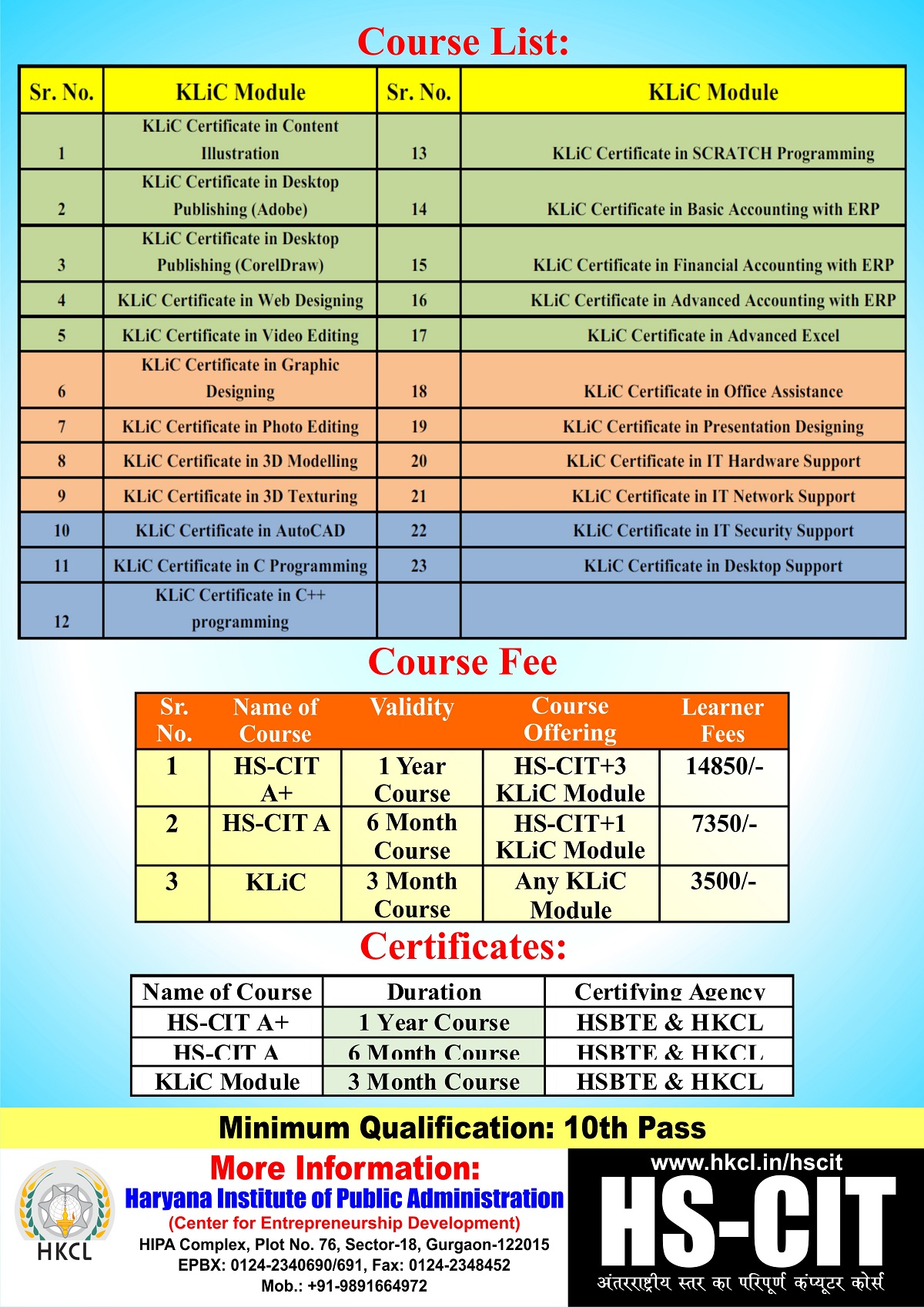About Us
The Centre for Entrepreneurship Development (CED) at the Haryana Institute of Public Administration (HIPA) was setup in HIPA in the year 1997-98 with support of the UNDP. The centre offers various courses on computer literacy, programming, and designing. However, with the advent of personal com- puting, it is felt that there is a need to reorient the centre towards a more dynamic and participative institution that can create new entrepreneurs. By providing a platform that connects established and aspiring entrepreneurs, the CED can go much further than providing digital literacy, especially in light of the state government’s efforts to promote entrepreneurship by supporting startups through policy measures, technology, and handholding.
The Government of Haryana has made sincere and concerted efforts over the previous five years to cre- ate a vibrant entrepreneurship ecosystem in the state. It has enacted policies such as Entrepreneur and Startup Policy, 2017 and Haryana Enterprises and Employment Policy, 2020 to nurture fledgling enter- prises and support existing organisations.
However, despite its best efforts, there are certain gaps that hamper the efficacy of the ecosystem for the entrepreneurs. The evaluation of HARTRON conducted by HIPA provides ample evidence for this claim. The white paper containing the findings, methodology, and instruments of the evaluation is at- tached with this document.
The main pain-points that the entrepreneurs referred to were lack of mentorship, unfulfilled promis- es relating to seed capital, limited access to government personnel, and few efforts to increase the visibility of the startups. There is thus a need the change the way in which we support entrepreneurs.
There is a need to bring in accessible established entrepreneurs for dedicated guidance and mentorship for nano enterprises and youth to better understand the challenges of actual business establishment. Further, the startup ecosystem as a whole needs to be revitalised and interconnected as the synergies that can be harnessed hold immense potential.
The rationale for HIPA to take up this project is as follows:
- The model is centred around capacity building of personnel. As HIPA is an institute that specialises in the field and has multiple decades of experience, it is well placed to address the multiple issues that emerge during such trainings. Further, we can extrapolate our learnings from past trainings to min- imise any prospective challenges that may come up in this new model.
- Secondly, as mentioned earlier, a key issue faced by entrepreneurs is the lack of government to business connect in the present ecosystem. HIPA can arrange direct dialogue with relevant government departments or authorities according to the need of entrepreneurs. Further, HIPA offers a platform to articulate policy changes needed or point out the constraints in existing government schemes.
- Further, HIPA is in the perfect position to be able to link industry associations, corporate parteners, government departments, and nano-enterprises because of its extensive network and ability to bring in field experts as per requirement.
Vision
To collaborate with industry associations, corporate partners, and institutes of higher education to con- nect the various nodes of entrepreneurial and quasi-entrepreneurial activity and synergise the isolated efforts of various stakeholders.
Mission
The Centre endeavours to create an ecosystem of entrepreneurial activity in which stakeholders from various parts of the state can come together and spark innovation through capacity building and coop- erative competitive practices. The mission encompasses three objectives:
- Creating a network of industry associations
- Linking nano and micro enterprises with corporate partners for capacity building
- Undertaking upskilling of youth via cohort bases experiential learning
Creating a network industry associations
The Centre will undertake rankings of all district industry associations based on a pre-defined method- ology. This exercise would be carried out on an annual basis and would aim to create a spirit of compe- tition between the industry associations similar to the World Bank’s Ease of Doing Business rankings. The ranking methodology will have parameters related to job creation, innovation, startup support pro- vided, and number of members in the association to promote the objectives of the state government with respect to the startup ecosystem. The rankings will be released annually and publicised widely along with names of chairpersons to further motivate the associations to work towards a better rank.
Further, the Centre will also institute an award for the most innovative startups that will be nominated by the associations. The award will also be based on pre-defined parameters and promote the objectives of the government through cooperative competition.
Linking nano and micro enterprises with corporate partners and institutes of higher education for capacity building
The Center would link nano informal enterprises with corporate partners that can undertake capacity building activities under their CSR programmes. For example, the many small roadside eateries in the state will be linked to the Taj Hospitality Chain, which can train the eateries on hygiene factors and the Centre will provide a certificate on behalf of the state government in conjunction with the training part- ner. Similar linking will be done for barbers, mechanics, and similar nano enterprises.
Research done in agricultural institutes of the states can also be put to practical use through appropriate training of grassroots functionaries and last mile businesses.
Undertaking upskilling of youth via cohort bases experiential learning
The Centre will be a platform to engage unemployed youth with industry incumbents in specified sec- tors. The industry incumbents will be partners and take up the role of primary trainers who will get ac- cess to highly motivated personnel for field operations. The trainees will benefit from on- ground expe- rience which will mould them into prospective entrepreneurs with a deep understanding of business principles and a state-wide network. The philosophy of the CED will be to promote enterprise through cohort based experiential learning.
A pilot for this programme was undertaken at HIPA and the results are explained below:
- A 3-week program on entrepreneurship in the solar sector was conducted with 40 nominated unem- ployed youth. The program touched on technical aspects of solar energy and the fundamentals of run- ning a business. Lectures were delivered by business leaders, academicians, and government officials.
- Solar energy companies in Gurugram were contacted post completion of this program to solicit their views on the training and their ideas to enhance its quality. The companies gave valuable suggestions for the same and expressed their willingness to be a part of the training module going forward.
- Similarly, the trainees were highly impressed with the structure of the programme. However, they ex- pressed that the practical aspect was found lacking and they would be benefited even more if there was an industry connect to the program
- Using the program as a pilot valuable lessons have been learned about the various logistics of running it sustainably and successfully, training multiple batches of unemployed youth across various sectors, and increasing employability in the state.
Courses offered


Activity
The centre’s activities will focus on understanding the needs of the entrepreneur’s in the state and ad- vancing the objectives of the state government. These activities will contribute towards increasing the productivity and quality of nano-enterprises, enhancing livelihood opportunities in the state, capacity building of youth, and structured growth of industry across the state.
The activities of the centre can be grouped into the following buckets:
Research
The centre will constantly undertake research on the best practices in certain industries and how these can be incorporated in the rankings and awards mentioned above. Similarly, the centre will keep a track of developments in the startup ecosystem initiated by the government to ensure that the objectives of the centre are aligned with the state.
Further, the centre will also undertake publication of the rankings in a scientific manner after proper research is conducted into the methodology and the application of the methodology in a practical setup.
Creating a pool of nano-enterprises, higher education institutes, and corporate partners
The centre will reach out to both, nano enterprises and corporate partners simultaneously to create a pool of trainees and trainers. The nano-enterprises will have to be educated on the benefits of the train- ings. Corporate partners will be onboarded by showcasing how the centre will utilise their CSR budgets in an efficient manner. Agricultural universities and management institutes that have a viable product, service, or concept will be invited to provide trainings on the usability of their products, service, or concept to the appropriate audience which may be an end user or retail seller.
Events
The Centre will emerge as a hub for entrepreneurial activity in the state of Haryana and as such under- take events that would be presided by eminent members of government and industry. Events such as awards for the best startups, publication of reports, and quarterly forums for nano-enterprises and un- employed youth will be hosted by the Centre. These events would also form a networking opportunity for the various invitees and further the spirit of collaboration in the state.
Trainings
The centre will undertake development of curriculum, shortlisting of training partners, and provision of space for trainings of youth from the state. The step wise plan for the same is mentioned below:
Selection of Trainees
Trainees are selected after application screening and interviews by HIPA. The applications will be in- vited through the data available with district employment exchanges across the state. These selected trainees would then be sent on-site to their mentors who would be allowed to weed out any non-serious applicants. These mentors would be selected by HIPA after carefully screening their business and their effectiveness in mentoring the trainees. The mentors themselves would be subject to review by HIPA .
Training Program
Trainees complete a month-long training module hosted by the mentor organisation centred around key business fundamentals of the sector. The training would focus specifically on the function within the sector in which the trainees will be expected to operate in the future. For example, sales in EPC of solar companies, or packaging of milk in the dairy industry. Technical training may be provided by HIPA Resource Persons if requested by mentors.
Year Long Immersion
Trainees will work as business partners of the mentors over the year learning the nuances of the sector. They would specialise in a particular function that is germane to their sector. Forums and workshops will be conducted at HIPA on a quarterly basis to help with re-training, knowl- edge exchange, networking, and community building.
Partnerships
- Partnerships will be forged with industry associations across the state. The associations will benefit because of the potential of increasing its members, gaining further legitimacy through rankings, and getting a chance to nominate the best startups in their district.
- Corporate partners that can provide trainings under their CSR programmes will be partnered with. Judicious and efficient use of their CSR budgets will be guaranteed by the Centre.
- MSME partners that can provide training to rural youth will be enlisted in certain sunrise sectors with high labour intensity.
- Partnerships with incubators, accelerators, and organisations that specifically promote entrepre- neurship across the state and the country will be forged to help trained entrepreneurs gain access to funds and further mentorship.
Evolution of the Centre
The centre would evolve by progressively increasing the complexity of its operations. The evolution will take place in three phases:
- Training Phase
- Partnership Phase
- Awarding Phase
Training Phase
The centre in this phase would undertake training of youth in Haryana in collaboration with MSME partners. As a pilot has already been successfully concluded and as some groundwork has been done beforehand, the centre will be able to undertake this task quicker than the rest.
Partnership Phase
In this phase the centre will tap into the network of corporate partners that can be onboarded and under- take extensive consultations with them to mutually agree on the design of the proposed collaborations with nano-enterprises and fine-tune any relevant activities that need to be undertaken beforehand.
Awarding Phase
In this phase, the centre will publicise its research, methodology, and parameters of ranking. All district industry associations will be educated about the rankings and awards prior to the judgement cycle and consultations will be undertaken with these bodies.
The centre will host events that will be chaired by eminent personalities in the government and industry to award the startups and publish the rankings.
Key Performance Indicators
Training
The centre will have trained at least six batches of rural youth by the end of the first year of its operations.
Corporate Partnerships
The centre will have at least three corporate partners running capacity building programmes in three different industries by the end of the second year of its operations
Higher Education Institutes
The centre will be able to tap into research by at least two education institutes in the state by the end of its second year.
Industry Associations
The centre will publish its report on industry associations with a buy-in from industry association of all 22 districts of the state and also present an award to a startup after receiving nominations from all asso- ciations by the end of the third year of its operations

